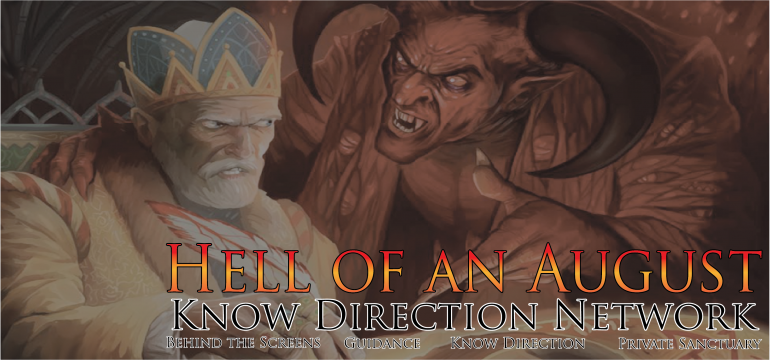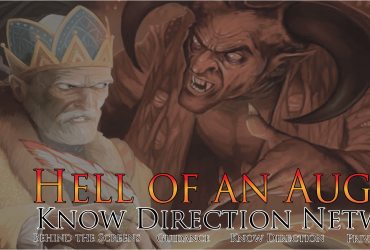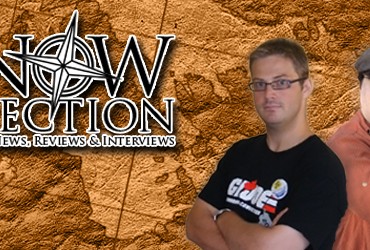Welcome to Guidance, Private Sanctuary’s source for tips and techniques for the Pathfinder Roleplaying Game, written by Everyman Gamer Alexander Augunas. Today, we’re going to be talking about rules lawyers.
Welcome back to Guidance on the Know Direction Network! We’ve got just two articles left in our Hell of an August special event and like many of you, I found myself thinking, “What the heck am I going to talk about that’s Hell-themed?”
Well, I came up with a topic, and its either going to annoy you or make you laugh your head off. Let’s see how many people I can irk with today’s topic: rules lawyering.
See that? That sound? That sound is great. Whether you’re laughing with me or pissed off that I might have just accused you of being a servant of Hell, that sound is AWESOME. Let’s get started, shall we?
What’s A Rule’s Lawyer?
I’m going to assume that you know that a lawyer is a person who practices law, and that working with the law involves the application of abstract legal theories and knowledge to solve specific individualized problems, or to advance the interests of those who hire the lawyer. Now, I’d like to say that my definition is solely my own, but its not. The concept of a rules lawyer is so well defined that it has its own Wikipedia page.
Seriously.
A rules lawyer is commonly defined a participant in a rules-based environment who attempts to use the letter of the rules without reference to its spirit in order to gain an advantage without that environment. Rules lawyering has likely existed for as long as games themselves have existed, because deep down everyone wants their envisioned outcome to be the correct one, and rules lawyers see the printed word as validation for their vision. But where things get tricky within the definition is the idea of “reference to its spirit.” In Pathfinder lingo, the concepts of “spirit of the rules” and “rules as they’re printed” are commonly abbreviated as RAI (rules as intended) and RAW (rules as written), and if you’ve frequented any Pathfinder forum, chances are that you’ve seen these two phrases before. They’re often uses in a right-versus-left fashion, a mono e mono system of arguing. Let’s watch.
RAW: The option clearly says [A].
RAI: The option might say [A], but clearly the designer meant [B].
And this, right here, is where the “lawyering” part of rules lawyering comes into play. Think of the laws in your home state, country, or providence as the “mechanics” by which every individual living there is expected to play. A real lawyer uses what she knows about those laws to either solve specific problems or advance the interests of her client. Along the same lines, a rules lawyer uses the “mechanics” by which every person setting at the gaming table is expected to play to either solve problems at the gaming table or advance the interests of her “client.” Only here, the “client” of a rules lawyer is usually the PC party or a specific character within that party.
Agents of Hell
If you’ve never had a poor run-in with a lawyer, you’re lucky. I have a friend who has a relative that hired lawyer who ignored the fact that said relative was clearly not of sound mind when she was hired, which caused a mess of problems for the family, none of which I care to repeat on a public venue such as a blog. Regardless, what I can do is assure that a decent lawyer who uses her powers for her own gain (or the gain of someone else) can spell disaster on a surprisingly potent scale. So too in the Pathfinder Roleplaying Game. Don’t get me wrong, you know me. I’m Mr. Crunch on the Know Direction Network. But someone seeking to bend every scenario to their own favor can cause a lot of havoc in-game, mostly in the form of wasting time. If you’ve been in a group with a guy who cries foul at every player’s turn and cites a dozen or more obscure rules to justify his ideas, you know what I mean. For some players, they’re wrong and although the time is wasted, the game isn’t disrupted. This is why rules lawyers are scary: at their worst, they’ll cross-reference so many different rules that the game grinds to a halt and then stays at a halt as the GM tries to effectively defend the game that’s being played. Everyone at the table stops having fun; the rules lawyer and the GM are pressed up against each other, forehead to forehead, as they duke it out while everyone one else around. And when its finally over and the rules lawyer stands victorious, everyone feels like they’ve lost.
Agents of Heaven
But just as there is law in Hell, there is also law in Heaven. Rules lawyering can be effective and even helpful if done correctly, but the key lies in scope and size, scope in the sense of, “How much does this impact the game?” and size in the sense of, “How long will this impact the game for?” The worst rules lawyers are the ones who use their knowledge of the rules selfishly or to instigate a confrontation with the GM. The best rules lawyers are the ones who use their skills upon request or alleviate confusion.
Given my own penchant for the rules, I’m sure it comes as no surprise to anyone that I can be a bit of a rules lawyer myself. But more than being a rules lawyer, I’m impatient. I hate siting around and waiting, and the last thing I want to do is step away from a game to argue with someone. So typically I don’t offer my own opinions or correct things that are happening in game unless other players act confused or someone asks a rules-based question. Sometimes this works out for me; I’ve been in games where the GM adjucated the cover rules incorrectly for a teammate and have said nothing; no one said anything, so its not my place to chime in and waste the group’s time correcting an error. Likewise, I’ve been in games where I’ve gotten penalties that don’t exist or watched the GM use monster abilities incorrectly. (The most famous of which was when a GM took the phrase, “at will” literally when we were fighting a group of devils with dimension door as a spell-like ability.) And here’s the reason I said nothing: It wasn’t relevant. Sure, my life would have been easier if those devils weren’t teleporting around the room as a free action every turn, but we weren’t unfairly losing the fight because of it. I was having fun. The other players were having fun. The GM was having fun. As a result, the rules error wasn’t relevant, so it wasn’t worth my time to dispute it. I said something to the GM afterwards about it, and you’ll never believe what happened next.
The GM started asking me questions he had during our future games together.
Advisor, Not Attorney
Being good at the rules is it’s own reward, I understand. It allows you to drastically improve your ability to survive and let’s face it: being powerful is fun. No one likes it when his or her epically cool character has a tight moment. But remember, rules lawyering for your fun inherently takes fun away from other people at the table; the other people at your table want to be going on adventures and fighting monsters, not arguing text with you when they could be playing a game. Have the foresight to realize when the rules error is a big deal and when its not and the respect to allow the GM to do her thing without disruption. When you get right down to it, attacking your GM with rules quotes over small problems just wears your GM down and makes her feel incompetent at her role in the gaming group, which could either see the group disband when it loses its GM or you removed from the group for your behavior. In both cases, you’ve won the battle but lost the war. But if you treat your GM with respect and respect the time and right to fun that every person at the table has, you’ll start to see your GM and your fellow players slowly start to as you for your input directly when they’re unsure of the rules rather than stay quiet. You’ll build rapport with your group and suddenly you won’t be a rules lawyer anymore, you’ll be an expert player that everyone trusts and admires.
Alexander “Alex” Augunas has been playing roleplaying games since 2007, which isn’t nearly as long as 90% of his colleagues. Alexander is an active freelancer for the Pathfinder Roleplaying Game and is best known as the author of the Pact Magic Unbound series by Radiance House. Alex is the owner of Everyman Gaming, LLC and is often stylized as the Everyman Gamer in honor of Guidance’s original home. Alex also cohosts the Private Sanctuary Podcast, along with fellow blogger Anthony Li, and you can follow their exploits on Facebook in the 3.5 Private Sanctuary Group, or on Alex’s Twitter, @AlJAug.







Leave a Reply